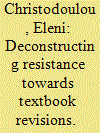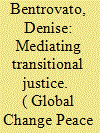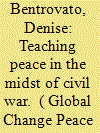|
|
|
Sort Order |
|
|
|
Items / Page
|
|
|
|
|
|
|
| Srl | Item |
| 1 |
ID:
161346


|
|
|
|
|
| Summary/Abstract |
This article investigates Greek Cypriot ‘discourses of resistance’ to potential revisions of history textbooks as part of a wider peace education process. Although changing history textbooks towards a more inclusive and pluralistic narrative is arguably a necessary step for a sustainable peace, efforts to do so have met with strong resistance and ultimately failed. Existing studies have illuminated the problematic historical content of these textbooks and often point towards the controversies raised, but rarely do they offer an in-depth analysis of these discourses about textbooks. This study seeks to fill this gap by deconstructing these ‘discourses of resistance’ to reach a deeper understanding of why this aspect of peacebuilding has failed. Empirical findings through an analysis of interviews, policy documents, newspapers, speeches and circulars indicate a pronounced link between education and security, which has until recently remained at the periphery of peacebuilding research. Discourses of resistance present changes to history textbooks as a betrayal and threat to the nationalist struggle, a process I argue constitutes the securitisation of history textbooks.
|
|
|
|
|
|
|
|
|
|
|
|
|
|
|
|
| 2 |
ID:
161343


|
|
|
|
|
| Summary/Abstract |
Japan’s kyōkasho mondai (history textbook controversy) is at a crossroads. This article tries to exemplify it through the analysis of three issue areas at three levels (international, domestic, and societal). Internationally, the study looks into the failure of much anticipated joint history writing projects with China (2006–2010) and South Korea (2002–2005, 2007–2010). Domestically, this study problematises the recent politicisation of the textbook adoption system through the analysis of the Yokohama and Tokyo cases. The article also discusses the role of Nippon Kaigi (The Japan Conference), an influential rightist lobbying group, in this process. In this conjunction, at the societal level, there seems to have been the growing sense of frustration and resignation with China / South Korea among the Japanese public (i.e. apology fatigue). All these suggest that there has been an underlying change in the landscape of history textbook controversy in Japan, which also cogently shows the on-going practical difficulty in building trustworthy relationships between Japan and China / South Korea. This study tries to offer a contextual understanding about the underlying conditions for (and, hence, the changing societal expectations about) textbook production, content and reception.
|
|
|
|
|
|
|
|
|
|
|
|
|
|
|
|
| 3 |
ID:
161342


|
|
|
|
|
| Summary/Abstract |
This paper is intended to contribute to the widening literature on the complicated links between education, the state and violence. It also builds on previous analyses of Pakistan Studies textbooks, and utilises notions of citizenship to illuminate inequalities and the theoretical lens of cultural violence. To do this, I present an in-depth analysis of the Pakistan Studies Textbook for Secondary Classes used in government schools in Islamabad Capital Territory. This textbook analysis was conducted as part of a case study of one girls’ secondary school in 2014 which linked citizenship education to Galtung's 1990 violence triangle. I also demonstrate through classroom observations of the case study school the power that the textbook holds as the voice of authority in the classrooms in which it is used. The analysis is situated it in the broader historical context of the process of nation building. I illustrate the specific ways the textbook contributes to the narrative of exclusion of some Pakistanis from equal citizenship which has the potential to normalise violence against excluded groups.
|
|
|
|
|
|
|
|
|
|
|
|
|
|
|
|
| 4 |
ID:
161344


|
|
|
|
|
| Summary/Abstract |
Transitional justice (TJ) and education have recently evolved into key areas of concern in processes of recovery undergone by societies emerging from violent conflict. Referencing the particular case of post-apartheid South Africa, this article investigates the distinct role of school textbooks as mediators of TJ in order to shed light on the under-researched interconnections between these fields. Its analysis of how South Africa’s history textbooks engage with the work of the Truth and Reconciliation Commission explores the discursive and pedagogical strategies they adopt as they deal with this high-profile TJ mechanism. The article’s theorisation will consider textbooks’ possible dual function as both instruments and indicators of broader post-conflict transformation by assessing the possibilities offered by a pedagogical model of TJ education involving history textbooks as ‘heteroglossic spaces’ and as ‘mediators of multivocal discourses’.
|
|
|
|
|
|
|
|
|
|
|
|
|
|
|
|
| 5 |
ID:
161341


|
|
|
|
|
| Summary/Abstract |
The aim of this article, and of the special issue it introduces, is to claim a more prominent role for the analysis of school textbooks when studying peace and conflict. School textbooks can contribute to several core discussions in this research field because they are indicators of dominant political knowledge, have privileged access to a large audience, and are objects of peace and conflict processes themselves. We reflect how the analysis of school textbooks has already contributed significantly to peace and conflict studies and outline avenues for further research.
|
|
|
|
|
|
|
|
|
|
|
|
|
|
|
|
| 6 |
ID:
161345


|
|
|
|
|
| Summary/Abstract |
Focusing on Sri Lanka, this article complements existing research on the adoption of global norms and discourses around peace education by illuminating the tensions between global and local demands in a multicultural society torn by conflict. In analysing a series of donor-funded official civics textbooks issued during the civil war, it identifies textbooks as sites of the conflictual ‘hybridisation’ of the liberal peacebuilding paradigm and the challenge to it posed by local interests and sensibilities. The analysis of the discourses around ‘good citizenship’ in Sri Lankan textbooks elucidates a case of the political co-optation of donor-driven agendas, traceable in the uneasy blend of a traditional and a global model of citizenship education simultaneously embracing and undermining liberal ideals of peacebuilding through emphases and silences that may risk compromising national reconciliation. The textbook discourses which enact these processes construct notions of social cohesion around civic virtues, frame rights as privileges earned through compliance and gratitude towards authoritative institutions, promote understandings of peace and conflict which highlight individual responsibility while obscuring systemic violence, and affirm social justice, democracy and human rights while evading the realisation of these ideals in practice.
|
|
|
|
|
|
|
|
|
|
|
|
|
|
|
|
|
|
|
|
|